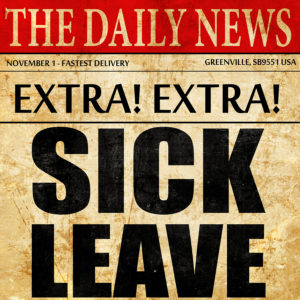What YOU need to know about the proposed Albuquerque Healthy Workforce Ordinance
 As soon as this fall, Albuquerque voters may be voting for mandatory paid sick leave for all Albuquerque employees based solely upon a brief, inadequate, 4-sentence description of a broad-reaching and harmful Ordinance. The so-called Healthy Workforce Ordinance would require all employers, big and small, to provide all employees within the city with paid sick leave. Implementation of this law would have a significant negative impact on Albuquerque employers. If adopted, the Ordinance would not be subject to revision or compromise, and would go into effect as is.
As soon as this fall, Albuquerque voters may be voting for mandatory paid sick leave for all Albuquerque employees based solely upon a brief, inadequate, 4-sentence description of a broad-reaching and harmful Ordinance. The so-called Healthy Workforce Ordinance would require all employers, big and small, to provide all employees within the city with paid sick leave. Implementation of this law would have a significant negative impact on Albuquerque employers. If adopted, the Ordinance would not be subject to revision or compromise, and would go into effect as is.
Would my organization be subject to the Ordinance?
Yes. All employers, large and small, with employees working in the City of Albuquerque would be subject to this Ordinance, without exception (even if the Organization itself is not based in Albuquerque, an employer only needs to have a “physical premises” in the City to be subject).
Would I have to pay all my employees paid sick leave?
All employees (including full-time, part-time, seasonal, and temporary employees) who work 56 or more hours within a year within the city limits of Albuquerque would have to be provided with paid sick leave. Employees who work less than 56 hours within Albuquerque city limits within a year would not need to be provided with paid sick leave. However, any employees, even those who are not based in Albuquerque, who do in excess of 56 hours of work (including training, meetings, sales calls, etc.) within City limits could be subject to the Ordinance if the employer has a physical premises in the City. Specifically, the language of the ordinance does not say that mandatory paid time off only accrues on hours worked within the City; it says that employees become eligible under the statute if they work 56 or more hours within the City and is silent as to where hours must be worked in order to qualify for accruals.
•How much paid time off are we talking about?
- Every single employer subject to the Ordinance would be required to provide every eligible employee with one hour of paid sick leave for every 30 hours worked.
Employers with less than 40 employees are considered to be “small employers” under the Ordinance. (For this purpose, the number of employees is determined based upon all employees within the organization, including those located outside of Albuquerque.) Small employers would be required to allow employees to use at least 40 hours of accrued sick leave each year. - Employers with 40 or more employees are considered to be “large employers” under the Ordinance. Large employers would be required to allow employees to use at least 56 hours of accrued sick leave each year.
Can’t I just keep using my existing paid time off policy?
Probably not. Most employers’ existing paid time off policies will not be in compliance with the strict requirements of the Ordinance. Compliant paid time off policies would need to:
- Provide to each and every eligible employee (including part-time, seasonal, and temporary employees who work at least 56 hours in the year within the City) at least one hour of paid sick leave accrual for every 30 hours worked;
- Track and report how each and every hour of paid leave was used (whether for sickness or another allowable reason under the proposed Ordinance, or whether the time off was used for a reason not covered by the Ordinance, such as vacation and family events). Employers would be required to maintain payroll records for each employee showing the weekly hours worked, wages paid, and the amount of paid sick time accrued and/or used each pay period;
- Accrue paid leave beginning the first day of employment;
- Allow employees to use accrued paid leave no later than 90 days after the start of employment;
- Allow employees who leave the organization and are rehired within 12 months to access previously accrued and unused paid leave; and
- Permit employees to carry over unused paid sick leave hours to the following year. There is no indication within the Ordinance that these rolled-over accruals cannot continue to build year-upon-year. As a result, employees who are rarely ill could end up carrying a large amount of accrued paid sick leave (which is often a logistical, accounting, and record keeping nightmare).
Can I require that an employee who takes paid sick time provide documentation confirming the reason that they were absent?
Yes, if the employee is absent for 3 or more consecutive days the employer may require that the employee provide documentation proving that their absence was for a purpose covered under the Ordinance. However, the employer is responsible for any out-of-pocket costs (such as co-pays) incurred by the employee in order for them to obtain documentation proving the reason for their absence.
Can I require that an employee who takes paid sick leave find a replacement to work their shift?
No. An employee can be asked to assist in finding a replacement, but their entitlement to use accrued paid sick leave cannot be contingent upon their locating a replacement to work for them.
What happens if an employee sues my organization under the proposed Ordinance? The setup of the Ordinance is harshly anti-employer and very favorable to employees seeking to file suit.
- The Ordinance creates a presumption of retaliation by employers. Essentially, if an employer chooses to terminate, demote, or take another non-favorable employment action (including bad marks on a review or a reduction in hours) within 90 days of that employee having made any noise about the Ordinance, or really, any employee who took leave under the Ordinance, then the presumption is that the employer retaliated and the burden of proof would be on the employer to demonstrate that they took the non-favorable action against the employee for some other, non-retaliatory reason.
- Employees would have the right to form a class action to sue an employer. Meaning that instead of facing individual lawsuits for violations, an employee (or former employee) could sue the organization on behalf of themselves and other similarly situated employees (the employee bringing suit would not need the consent of the other employees to file suit on their behalf).
- Under the Ordinance, a successful suit against an employer could cost the employer:
– Damages to account for “appropriate legal and equitable relief” – a fairly arbitrary amount set by a judge or jury;
– Three times the dollar value of any sick leave due but not granted or paid by the employer;
– Civil penalties of $50 per week per employee (maximum of $500 per employee);
– Costs and attorney fees incurred by the employee(s) and their attorneys in bringing the suit (in many cases, this will be the most expensive part of a violation); and
– In the case of a finding that the employer retaliated against the employee for asserting his or her rights under the Ordinance, reinstatement of the employee to their previous job and/or additional monetary damages including lost wages. - Under the Ordinance, employers can also be subject to audit and investigation by the City Attorney’s Office. The City Attorneys would be empowered to investigate and inspect employer records, enforce penalties payable to the City, and grant employees (and/or former employees) monetary damages.
Bottom line, the proposed Albuquerque Healthy Workforce Ordinance would create a tremendous burden on Albuquerque businesses. Employers would be forced to overhaul existing paid time off policies (or do away with them all together and return to the days of separate sick and vacation leave banks) and would be exposed to a potential legal minefield.
Studies Show Paid Leave Mandates Hurt The Economy

“One of the great mistakes is to judge policies and programs by their intentions rather than their results.” – Nobel Prize winning economist Milton Friedman
Sick Leave mandates look good on the surface but studies show that they come at the expense of lost hours and lower wages.
Every business person knows the consequence of increasing the costs of doing business. Either they must get more money in the door to pay the increase or something else must give. Any business person can tell you that increased government regulation and unfunded mandates puts a strain on the ability to employ more people.
Every new mandate comes at a cost. If businesses have to provide paid sick leave, their employees will face cuts in wages or other benefits, like health insurance, retirement, or vacation.
Here are three studies that show how sick leave mandates have negatively affected different cities:
The Effect of Mandatory Paid Sick Leave Policies – Reviewing the Evidence
Sick Leave Comes at Too High a Cost
By Carol Wight – Chief Executive Officer – New Mexico Restaurant Association –
Albuquerque Journal-Wednesday, July 12th, 2017.
A recent opinion piece by an Albuquerque restaurant owner shows she is passionately in support of a sick-leave ordinance. Unfortunately, it appears she has not read and analyzed the entire ordinance, or she would have a better appreciation and understanding of the significant costs and risks to her business and to all Albuquerque businesses imposed by this ordinance, far beyond just the cost of providing sick leave.
As the director of the New Mexico Restaurant Association, I have not only read the ordinance, but I have had it analyzed by human resources professionals and employment lawyers to evaluate the impacts to our members. Every new mandate comes at a cost, and the cost of this ordinance is significant. In fact, the only exception to compliance is for companies with collective bargaining agreements, which may be the real reason for this ordinance – to encourage growth in union membership.
Using the numbers from the proponents, the sick-leave ordinance would cost Albuquerque businesses an estimated $38 million annually. Where does this money come from? There is no extra money in the economy, there are no “fat cats” making these millions of dollars in Albuquerque. This is money that is going to make payrolls right now, and when it’s mandated to pay sick leave from payroll, the jobs of 107,000 workers will be at risk.
Albuquerque Journal Editorial

Editorial: Voters should know what they are really voting on
The Albuquerque Journal
By Albuquerque Journal Editorial Board
Monday, May 15th, 2017 at 12:02am
https://www.abqjournal.com/1003305/voters-should-know-what-they-are-really-voting-on.html
Governing by referendum might be good politics, but it’s bad policy. It’s just not a good idea to circumvent the elected body that voters have entrusted to represent them.
Sadly, that issue has for now been relegated to the category of academic debate in Albuquerque, where it is way too easy to get an initiative on the ballot. So attention now turns to the mechanics of how this works in the context of a city election.
In that regard, state District Judge Alan Malott and now the state Court of Appeals have made important rulings that mean voters will have the opportunity to read the proposed ordinance they are voting on, and if they can get through it, gain a feel for its scope and potential far-reaching impact.
The benign-sounding “Healthy Workforce Ordinance” is set to appear on the Oct. 10 city election ballot, barring a successful attempt by several business groups to knock it off on the argument it is unconstitutional “logrolling” that combines two separate issues into one for purposes of voting. Opponents also argue the referendum isn’t allowed under state home-rule provisions that govern Albuquerque.
While paid sick leave is a reasonable policy discussion to have – and the City Council would be an appropriate venue to vet proposals, weigh unintended consequences and draft legally sound legislation – the proposed ordinance is seven pages chock-full of unreasonable requirements ranging from coverage of temporary workers to onerous record-keeping requirements. It would eviscerate existing PTO policies now in effect at many companies, and, incredibly, it would enact a presumption of retaliation for any employment action that followed an employee’s use of sick time.
The ordinance would apply to full-time, part-time and temporary workers at any business with a physical presence in Albuquerque, could force some small businesses to simply close up shop and provide others with a reason to employ as few people as possible.
Finally, it would preclude any future City Council from reducing any of the benefits. Need to clean up the mess? It has to go back to the voters.
Is it any wonder supporters prefer that a sanitized summary go on the ballot rather than all seven pages of micromanaging and meddling?
Malott had ruled earlier the City Charter required the full ordinance to be published on the ballot. Several activist groups including Healthy Workforce ABQ and the OLE Education Fund asked the Court of Appeals to overrule Malott and instead allow a summary. The Court of Appeals declined and also refused a request to forward the question to the state Supreme Court.
If Albuquerque is going to run on referendum, voters at least deserve a fighting chance at knowing what’s fueling those decisions. These court decisions allow that to happen.
This editorial first appeared in the Albuquerque Journal. It was written by members of the editorial board and is unsigned as it represents the opinion of the newspaper rather than the writers.
Paid Sick Leave Full Text On Ballot In Albuquerque

A.C.H.E. Gets a Win!
Albuquerque taxpayers, employers and employees should all be relieved that the District Court, the New Mexico Supreme Court and now the New Mexico Court of Appeals have all rejected the Plaintiffs’ latest effort to hide and obscure the onerous and extreme details of their sick leave ordinance.
The Plaintiffs’ latest efforts to hide the details of their proposed sick leave ordinance by letting voters see ONLY a misleading summary (instead of the text and details of the seven pages) has now been rejected by the District Court (twice), the New Mexico Supreme Court and the New Mexico Court Appeals.
Ole´, formerly known as ACORN, and the other plaintiffs will now have to explain how their 7 page sick leave proposal in small print, does not constitute “voter fraud” by the inclusion of so many separate , expensive and extreme mandates that will drive employers and employees out of Albuquerque and New Mexico.
A.C.H.E., the Albuquerque Coalition for a Healthy Economy, filed a brief in opposition to the interlocutory appeal and the NM Court of Appeals agreed with our position and denied the plaintiffs’ filing.
Press Release Coalition Files Lawsuit
 FOR IMMEDIATE RELEASE
FOR IMMEDIATE RELEASE
April 3, 2017
COALITION FILES LAWSUIT OVER PROPOSED SICK LEAVE ORDINANCE
Log Rolling Unfair to City Voters and Damaging to Job Opportunities
(Albuquerque)-The Albuquerque Coalition for a Healthy Economy (A.C.H.E.) today announced a lawsuit against the City of Albuquerque in State District Court due to the Healthy Workforce Ordinance. A.C.H.E. members believe the proposed ordinance is a fraud on city voters because it hides a vast number of punitive, unnecessary and expensive details from public debate and consideration. The proposed ordinance funded by a collection of out of state special interests presents at least seven different questions as one. Voters will be forced to decide on the ordinance during the October 3rd Municipal Election. If enacted the ordinance will be the most expensive and expansive in the nation, leading to lost job opportunities and businesses to relocate.
“Presently, the healthy workforce ordinance is logrolling on steroids,” said Pat Rogers, attorney representing the Albuquerque Coalition for a Healthy Economy, “Voters who may favor the basic premise or parts of the basic proposal, will certainly disagree with the small print details hidden in the ordinance.”
“Most employers’ existing paid time off (PTO) policies will not be in compliance with the strict requirements of the Ordinance. So, employees will lose their PTO and have to revert to sick
leave and vacation time.” said Carol Wight, CEO of the New Mexico Restaurant Association and a member of the coalition.
The petition summary of the seven-page ordinance clearly outlines the diverse, varied and multiple questions being asked of voters.
- Requires Albuquerque employers to provide earned sick leave to employees who work as few as 56 hours in the city of Albuquerque at the rate of one hour of leave per 30 hours worked.
- Provides that employees may use sick leave for their own or a family member’s illness, injury, or medical care, or for absences related to domestic violence, sexual assault or stalking. Not just family injuries, care or treatment triggers coverage for the employee, but also anyone with a close relationship to the employee, the employee’s spouse or partner that needs care or treatment can trigger the sick leave time off.
- Provides that employees of businesses with 40 or more employees may use up to 56 hours of accrued sick leave each year, and employees of businesses with fewer than 40 employees may use up to 40 hours of accrued sick leave each year.
- Provides that employers must notify employees of their rights and maintain extensive records.
- Provides for public enforcement, a private right of action, and liquidated damages and penalties for noncompliance. Lawyer fees are mandatory only for plaintiffs. No penalties for false or fraudulent claims. The ordinance is written to make it essentially impossible for employers to raise any questions about the use of the sick leave.
In the 2012, Albuquerque minimum wage debate, District Court Judge Nan Nash identified the problem of log rolling in stark terms. Presenting more than one unrelated question to the voter as a question has been called ‘the vice of doubleness’ and is ‘“universally condemned’ as a species of voter fraud. Judge Nash held that because the proposed voter initiative (minimum wage) presents more than one issue for voters to decide with only one vote, it is invalid on its face. The same legal issues hold true for the sick leave ordinance.
This October, Albuquerque voters will be voting for mandatory paid sick leave for all Albuquerque employees based solely upon a brief, misleading 4-sentence description of a broad-reaching and harmful Ordinance.
The so-called Healthy Workforce Ordinance would require all employers, big and small, to provide all employees (full-time, part-time and temporary) within the city with paid sick leave.
Implementation of this law would have a significant negative impact on Albuquerque employers. If adopted, the Ordinance would not be subject to revision or compromise, and would go into effect without any public hearings or consideration of the harmful details.
“This is going to chase good employers out of Albuquerque and New Mexico in a hurry,” said Rogers.
###
About Albuquerque Coalition for a Healthy Economy
Albuquerque Coalition for a Healthy Economy is made up of 28 diverse business organizations and associations formed and dedicated to improving the metro area’s overall economy and defeating the Implementation of a sick leave ordinance that would have a significant negative impact on Albuquerque employers. To calculate the cost to your business visit https://abqche.org/
Paid Sick Leave Coalition’s Associations
Albuquerque Coalition for a Healthy Economy (ACHE)
- Albuquerque Economic Development
- Albuquerque Economic Forum
- Albuquerque Hispano Chamber of Commerce (AHCC)
- American Subcontractors Association NM (ASA-NM)
- Apartment Association of NM (AANM)
- Associated Builders & Contractors NM (ABC)
- Associated General Contractors (AGC)
- Commercial Association of REALTORS® (CARNM)
- Greater Albuquerque Innkeepers Association (GAIA)
- Greater Albuquerque Association of REALTORS® (GAAR)
- Greater Albuquerque Chamber of Commerce (GACC)
- Home Builders of Central NM (HBA)
- Mechanical Contractors Association of New Mexico (MCA)
- National Association of Women Business Owners (NAWBO)
- National Federation of Independent Business (NFIB)
- NAIOP Commercial Real Estate Development Association
- New Mexico Association of Commerce & Industry (NMACI)
- New Mexico Business Coalition (NMBC)
- New Mexico Council of Outfitters and Guides (NMOG)
- New Mexico Hospitality Association (NMHA)
- New Mexico Restaurant Association (NMRA)
- New Mexico Retail Association (NMRA)
- New Mexico Roofing Contractors Association (NMRCA)
- New Mexico Utility Contractors Association (NMUCA)
- Rio Grande Foundation
- Sheet Metal & Air Conditioning Contractors Association of NM (SMACNA)
- Visit Albuquerque *(formerly Albuquerque Convention & Visitors Bureau)
Paid sick leave proposal can only hurt Albuquerque
Guest Column – Albuquerque Journal.
By Jason Espinoza And Lynne Andersen.
Sunday, July 10th, 2016 at 12:02am.
A new ballot petition for a proposed paid sick leave ordinance will change the way most businesses in Albuquerque pay their employees. The ordinance is poorly written with inflexible mandates, and significant compliance costs for taxpayers and businesses.
Mandating a one-size-fits-all system of paid sick leave will force businesses, no matter the industry, to change their leave policy to comply with the mandate language. Even businesses that have a generous paid-time-off (PTO) policy will likely have to go back to sick pay in lieu of PTO unless their PTO plan is in compliance with the stringent standards imposed by the proposed ordinance.
News Coverage: Wrangling over paid sick leave in Albuquerque
Albuquerque Journal
By Dan McKay / Journal Staff Writer
Copyright © 2016 Albuquerque Journal
It’s a debate that’s rattled Colorado, New Jersey and Washington.
Now it’s Albuquerque’s turn.
Supporters of a proposal called the “Healthy Workforce Ordinance” say they hope this fall to make Albuquerque the first city in the state to require that employers offer paid sick leave to their workers.
They plan Monday to turn in the last batch of petition signatures needed to get the proposal before voters, though it isn’t clear yet whether the measure actually will end up on the Nov. 8 ballot or will have to wait until the next city election in October 2017.
Restaurant Association Weighs In On Sick Proposal
Just when you think it’s safe to go back in the water – safe to hire a few more people, expand your restaurant, do a few renovations… The unions have developed yet another political scheme to put a damper on the business climate in Albuquerque. This time it’s sick pay for everyone!
The proposed measure:
- Requires Albuquerque employers to provide earned sick leave to employees who work at least 56 hours in the City of Albuquerque at the rate of one hour of leave per 30 hours worked.
- Provides that employees may use sick leave for their own or a family member’s illness, injury, or medical care, or for absences related to domestic violence, sexual assault or stalking.
- Provides that employees of businesses with 40 or more employees may use up to 56 hours of accrued sick leave each year, and employees of businesses with fewer than 40 employees may use up to 40 hours of accrued sick leave each year.
- Provides that employers must notify employees of their rights and maintain records.
- Provides for public enforcement, a private right of action, and liquidated damages and penalties for employers.
This scheme comes in the form of a ballot initiative, requiring 14,000 signatures, to go on the November ballot. The unions have 60 days to get enough signatures. They then need to petition the city and county to put the measure on the ballot.
NMRA’s position is that labor laws should be made by the state legislature. Businesses are already subject to state and federal employment laws and audits. Ballot initiatives that stipulate employment law, in individual municipalities, leads to additional enforcement and auditing, subjecting businesses to additional burdens. These burdens are especially difficult for small businesses that do not have legal staff to interpret every nuance, of every new law, in every jurisdiction. These measures put undue burdens on employers. This also maintains a level playing field across political subdivisions and removes confusion for businesses operating in multiple locations around the state.
We understand that every employer would love to have enough profit to provide sick leave for all employees. Unfortunately, many smaller restaurants don’t have the profit margins to make sick leave a reality for their staff. The average restaurant profit margin is 5% if you are doing everything right. Sick pay sounds good and worthy but the fact is employers are overly burdened with labor laws from all sides, you really have very little capacity, not to mention money, to handle one more mandate.
